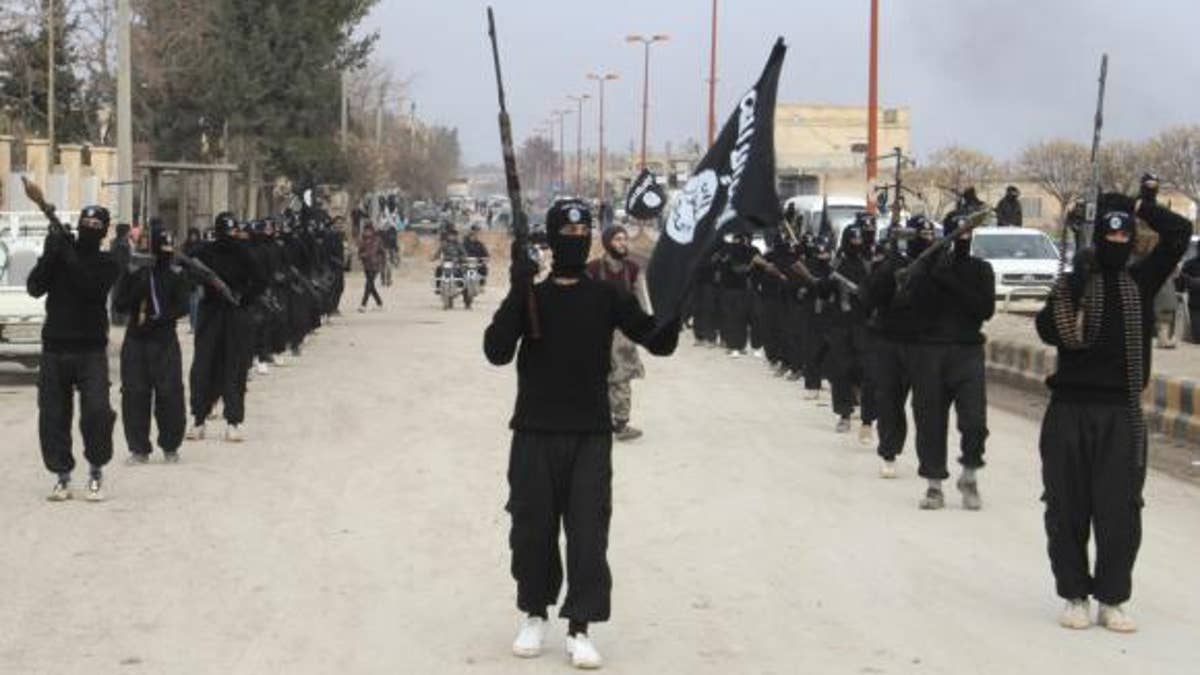
Fighters of the Islamic State recently burned to death five women and their sons, according to reports from Iraq. (Reuters)
The Islamic State is garnering headlines and international contempt, but when it comes to mounting a serious attack on American soil, it can't match the "tradecraft" of Al Qaeda, several terror experts told FoxNews.com.
Islamic State has the fighters, money and bloodlust to pose a rapidly-expanding regional threat in Syria and Iraq. But the upstart terror organization, at least for now, likely lacks the contacts, expertise and global reach to direct a 9/11-style attack on the U.S. Al Qaeda, by contrast, has dedicated and wizened jihadists skilled in bomb-making, disguise, document counterfeiting and logistics, say experts. And Al Qaeda, which this week announced it has expanded into India, has tentacles around the world.
“When looking at them [Al Qaeda and ISIS], there are two things to consider: The ability to launch an insurgency and the ability to coordinate terror attacks,” Scott Stewart, vice president of tactical analysis at geopolitical research firm Stratfor, told FoxNews.com. “Just because you can run an offensive in Iraq or Syria doesn’t mean you can run to New York and coordinate a terror attack. Most of these [newer] groups have not shown the ability to do so. Among the jihadist actors, Al Qaeda does have the highest level of terrorist tradecraft.”
[pullquote]
The two terror groups are in a frightening rivalry to recruit fighters and funding, and the big prize is a successful attack on Uncle Sam.
“Al Qaeda and ISIS are in a competition and hitting the U.S. dramatically, preferably in the homeland, is key to winning,” Ryan Mauro, a national security adviser with The Clarion Project, told FoxNews.com. “Al Qaeda needs to prove it is still viable and relevant in light of ISIS’ success. And ISIS will be universally recognized as having eclipsed Al Qaeda if it can strike inside the U.S.”
Former CIA Deputy Director John McLaughlin said ISIS has the momentum to surpass Al Qaeda as a global threat, largely because its so-called "caliphate" in Syria and Iraq gives it a haven from which to operate.
“The success of ISIS gives them an incentive to want to attack the U.S. in order to compete for attention, recruits, and funding within the terrorist world,” McLaughlin told FoxNews.com.
Yemeni-based Al Qaeda in the Arabian Peninsula has twice come close to pulling off attacks in the U.S. in recent years. A 2009 attempt to blow up a Northwest Airlines flight as it neared Detroit failed when Umar Farouk Abdulmutallab's underwear bomb failed to detonate. Nearly a year later, sophisticated bombs hidden inside printer cartridges were discovered on two separate cargo planes based on intelligence provided by Saudi security officials. Both flights originated in Yemen and were bound for the U.S. when the bombs were discovered during stopovers.
"We have to assume that Al Qaeda, though under enormous pressure in recent years, still wants to attack in the U.S., but is struggling to regain the capability and to overcome the obstacles our defensive measures have erected," McLaughlin said. "In other words, doing it would be much harder for them today than at 9/11."
While planning and executing a coordinated attack on the U.S. remains a major challenge for any terror group, inspiring "lone wolf" sympathizers to conduct attacks is much easier for terror groups, and not just Al Qaeda and Islamic State. Somali-based al-Shabaab, the Pakistani-based Taliban/Haqqani Network, Al Nusra, which is operating in northern Syria and Nigeria's Boko Haram have all tried to radicalize U.S. citizens.
“The greatest threat is from a sympathizer of Islamist terrorists already here," Mauro said. "Given the attraction of ISIS right now, that is who the perpetrator would mostly likely identify with.
“These local groups have a record of recruiting Americans to come join them overseas and sometimes to even support them from inside America,” he added. “It is conceivable for any of these group’s supporters inside the U.S. to carry out an attack on the homeland. All it takes are a few nudges from the group itself, Islamists outside the group, or their own personal ego.”
In that case, which terror group claims credit is unclear, but it would be the U.S. that is in danger.
“If it's a homegrown terrorist acting mostly independently, I think he's most likely to identify with ISIS while still having admiration for Bin Laden and Al-Awlaki,” Mauro said. “We are going to see people radicalized by Al-Qaeda-type preaching but ultimately choosing to affiliate with ISIS.”
Such attacks have already happened, where radicalized sympathizers in the U.S. kill without explicit orders from a terrorist group. Stewart noted the Tsarnaev brothers, who used pressure cooker bombs at last year's Boston Marathon, and Army Maj. Nidal Hasan, who killed 13 and injured 30 in a shooting rampage at Fort Hood military base in Texas in 2009, appeared to be inspired, but not directed by Middle East terror groups.
“The main concern is these grassroots individuals already here pursuing an ideology of committing jihad in the west," he said. "That’s the issue now."








































